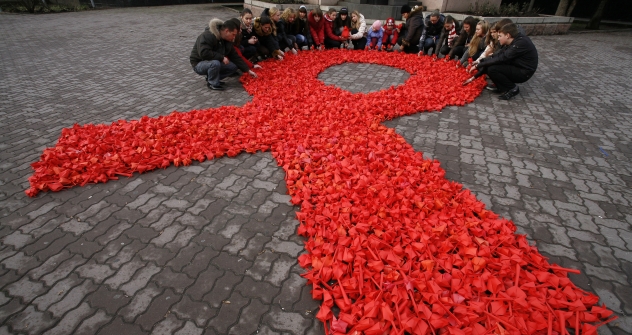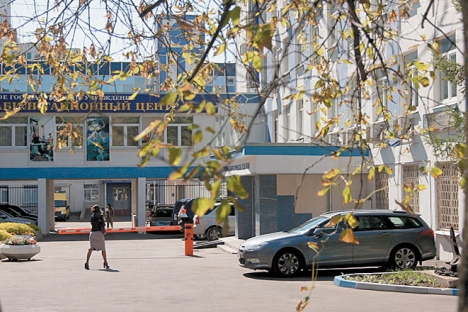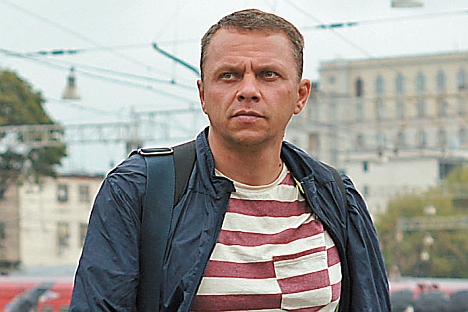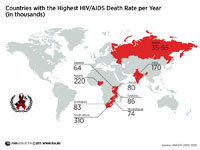Russians talk about life with HIV

It has been 25 years since the first reported case of HIV in Russia, but there is no national strategy to fight the virus, according to advocates. Source: Reuters / Vostock Photo
{***Russians talk about life with HIV***}
Alina, a strikingly beautiful woman and mother of an 11-year-old daughter, lives in Yekaterinburg, the largest city in the mountainous region that straddles Europe and Asia. She has an obvious limp from a congenital birth defect. Alina traveled the 1,750 miles to Moscow this summer because she desperately needs a hip replacement, which doctors in Russia had so far refused to perform.
Alina has HIV, the virus that causes AIDS.
Related:
In the past two years, she has had seven hospitals turn her down. Some refused to operate for what they called medical reasons, while at least one doctor told her directly that the hospital would not deal with HIV-positive patients. But recently, the medical treatment and rehabilitation center of the Russian Ministry of Health in Moscow agreed to perform the replacement. “I’m shocked,” she said, laughing with relief.
Alina is no stranger to discrimination, and laughter seems to work for her as a buffer against the stigma she has endured. She found out she was HIV positive 11 years ago when she was pregnant with her daughter. The doctors called her a prostitute, she said. They said she was “reprehensible.”
“The doctors humiliated me, saying, ‘Why did you give birth?’ I began to draw into myself, and then hit the sauce. I was drinking, drinking, drinking, feeling like I was already an alcoholic,” she recalled.
After the despair, a new resolve
A recent poll by the independent, Moscow-based Levada Center, conducted in cooperation with the United Nations, showed that 76 percent of Russians with HIV felt shame and guilt. Seventy-eight percent are afraid of discrimination and condemnation from others.
Alina said her husband helped lift her out of the despair of depression. “When he found out, he didn’t turn his back on me. ‘I love you, it doesn’t matter to me,’ he says, to this day,” she said.
But, in the end, she said, she pulled herself out of the depths: “I’m strong. I just like my appearance, and when you drink, that’s the end. I thought to myself, better to be beautiful for a while longer.”
Alina said she is unsure how she contracted the virus. “I’ve tried all sorts of drugs. But I have never shot up [using someone else’s needle]. It’s unlikely that it was from a syringe. I suspected one dude, but we lost touch then.
I don’t know.” Alina speaks candidly, but asked us not to give her last name, for fear that someone will read about this in her hometown where it is already hard for her to find work.

Roszdrav rehabilitation center agreed to treat Alina. Source: Vladimir Ruvinsky
{***The more you know, the easier it is to live ***}
“The more you know, the easier it is to live.”

After learning about his status, Savitsky studied psychology to work with HIV positive clients. Source: Vladimir Ruvinsky
In contrast to Alina, 39-year-old Muscovite Alexander Savitsky does not hide his status – anymore. “When I found out in 2000 that I was HIV positive, I decided that I’ll live another half year and that’s it,” he recalled. He now has a wife, who is also infected, and two children – both healthy and free of the HIV virus. He also has a job that he loves – he trains psychologists to work with people who are HIV positive.
Twelve years ago, when Savitsky was 27 years old, it seemed unlikely, if not impossible, that he could have a full life. At that time, he lived in northern Russia, not far from Nizhnevartovsk in West Siberia, where he had a job working in the oil and gas fields. Like many in his hardscrabble town, he contracted HIV through drugs.
His mother took him to Moscow to a non-profit, privately run treatment center. Savitsky said that his response to the diagnosis may have saved his life. He could have died from an overdose like some of his friends. Instead, he started to think about how to live out the time he had, knowing his life might be short.
The first thing that helped Savitsky was group psychotherapy and support through the “Imena” foundation, where activists offered information on how to stay healthy, including utilizing the drug protocols that suppress the virus. “When I started going to group sessions, I saw a lot of people like me,” he recalled.
He discovered that the drug combinations, which were becoming more widely available, often control the virus. The protocol involves no less that three different drugs taken together so the body does not become immune to any one drug. But patients must be educated in their own treatment, and the drugs must be easily available.
At first, Savitsky suffered from deep depression much like Alina, but he also turned his attitude around: “My logic was simple: the more I know about this, the easier it will be for me to live.” He realized his body had to be strong to fight the disease. “I changed my attitude toward life, toward myself, and toward the people around me.”
At first, he did not tell anyone he had HIV. “I have children; one of my daughters was born before I got HIV, the other after. I’m not afraid for myself, but the potential stigma toward them worries me,” he explained. Savitsky became more forthcoming about his diagnosis when, after finishing his degree in psychology, he started to work in rehabilitation.
Savitsky and Alina both say that since 2001, doctors have changed their attitude toward the disease and people who contract it. They said that AIDS centers have appeared, offering medical, psychological and social help. In Moscow, it is no longer necessary to make an appointment with a specialist three months in advance and stand in line for hours. Doctors, trained in the disease, do not insult their patients. But according to Savitsky, there are only a handful of these centers across the country: “A lot depends on the local authorities; there are regions, where help is at a very high level, which is due to the fact that there is competent leadership there.”
{***NGOs on the frontlines***}
NGOs on the frontlines
Non-governmental organizations (NGOs) with foreign funding have been at the forefront of helping people with HIV/AIDS. A new federal law hampers the ability of Russian NGOs to apply for foreign funding. Although the law was written to address political NGOs, each organization feels the restrictions. It is highly unlikely the government will step in to fill the void, according to advocates. So while treatment has improved in recent years, the funds are now rapidly drying up.
Alina and Alexander Savitsky have learned to live well with HIV. But they worry about young people contracting the virus today, and what kind of services they may find.
From 2004 to 2006, Russian non-profit organizations received three large five-year grants from the Global Fund to Fight AIDS, Tuberculosis and Malaria. Preventive measures were being carried out with NGOs in many Russian regions. “This was the sole bridge between people with HIV on the street and social-medical centers,” said Pavel Aksenov, director of the ESVERO fund, which educates high-risk groups such as drug users and sex workers with ways to prevent HIV/AIDS.
The Ministry of Health and Social Development of Russia, in the wake of the fight over foreign funding of Russian NGOs, no longer allows other countries to finance Russian NGOs. Russian funding has not increased. HIV and tuberculosis programs have since collapsed. “The government has not proposed any return of adequate funding or programs,” said Sergei Smirnov, the director of Community of People Living with HIV.
In 2011, 62,000 new patients appeared, five percent more than the previous year. There are 665,000 Russians registered with HIV/AIDS. Advocates say the actual number is much higher.
It has been 25 years since the first reported case of HIV in Russia, but there is no national strategy to fight the virus, according to advocates.
“I found my own way,” said Savitsky. “You can’t expect someone else to save you when you’re drowning, you have to learn to save yourself,” he said. Alina, however, said she believes in people’s compassion. Volunteers helped her find the hospital that agreed to operate on her hip. “Before I felt like an outcast, but now [I feel] like a normal person,” she said. “They are going to do the operation. Life goes on.”
All rights reserved by Rossiyskaya Gazeta.
Subscribe
to our newsletter!
Get the week's best stories straight to your inbox
